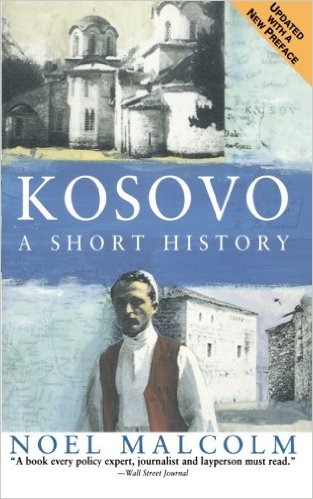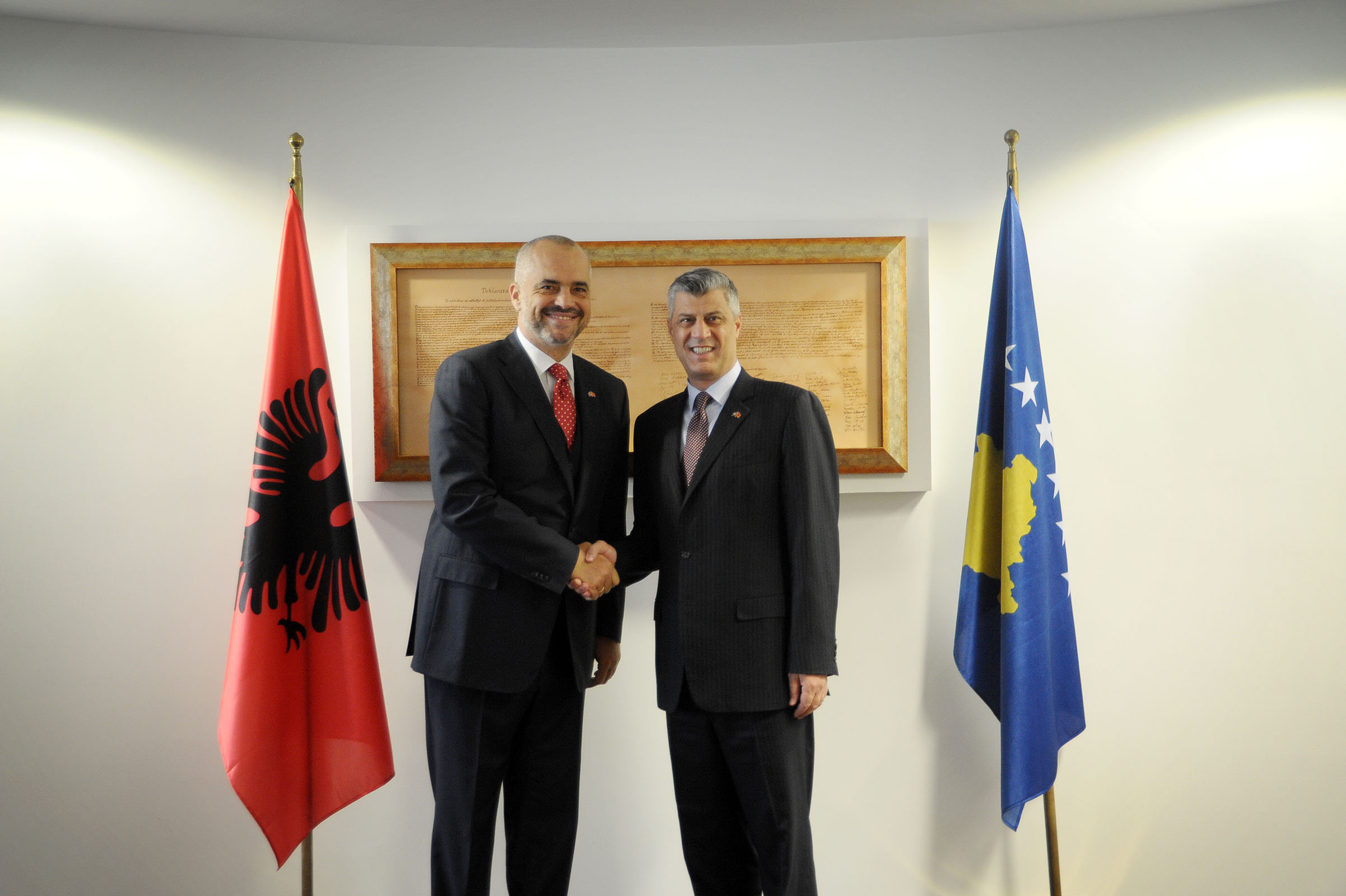
Views: 2416
Noel Malcolm – Kosovo – A Short History
History is written with an attempt to support Albanian territorial claims in the Balkans
A Short History of Kosovo by Noel Malcolm is usually considered as one of the prime historical sources on the history of the province. In fact, this book is an example of History with a political attitude because it is not by chance that Malcolm who attacks the “myths” of Serbian history is at the same time a president of the Anglo-Albanian Association and one of the strongest supporters of independence of Kosovo. Being far from an objective scientific work Malcolm’s History of Kosovo can be better classified as a kind of historical pamphlet which will not easily outlive the present political moment for which it was written.
Similarly, like his Shorter History of Bosnia, in which he idealizes the Ottoman rule beyond any measure, the Short History of Kosovo will find eager readers only among those who seek instant, black and white histories and do not have much time and intellectual eagerness to delve more deeply into the history of the Balkans.
With the boldness of an experienced historian, although he has written very few historical books, Malcolm in his rather journalist style very subjectively draws conclusions out of his carefully filtered bibliography in which Serb sources hardly find any place at all. But, more than anything, it is very strange that Malcolm almost completely ignores Serbian Orthodox archives and libraries although more than 90% of all cultural and historical monuments in Kosovo belong to this Church. Furthermore, although Malcolm consulted 16 different archives in six countries, none of them were in Serbia. It is a puzzling gap indeed because so many other sources have been explored. This fact, most persuasively reveals that this is in fact a book intended to falsify the history rather than to approach it in an evenhanded and scientific way.
INSTITUTE OF HISTORY
of the Serbian Academy of Sciences and Arts
Collection of Works
Volume 18
Response to Noel Malcolm’s Book
KOSOVO. A SHORT HISTORY
Scientific Discussion on Noel Malcolm`s book “Kosovo. A Short History”
(Macmillan, London 1998, 492)
8th October 1999
This book contains eight historical studies with the criticism of Noel Malcolm’s book: Kosovo A Short History. The texts were read at the Discussion organized by the Historical Institute of the Serbian Academy of Sciences and Art in Belgrade on October 8, 1999.
“Needless to say, the motifs for this Discussion are scientific. It was not organized because the book in question is worthy of it as a scientific work, but because it deals with a phenomenon deserving to be thoroughly discussed. Noel Malcolm’s book Kosovo. A Short History is not a scientific work, yet the general public, and even some professional circles, have accepted it as an objective presentation of the past, notably the past of Kosovo. The publicity it has received in many media in the West, as well as its eager inclusion in the holdings of many libraries, bear witness to that”.
From the Foreword of the Editor-in-Chief
Prof. Slavenko Terzic
Foreword
About This Scientific Discussion
October 8, 1999
By Slavenko Terzic
The Discussion on Noel Malcolm’s book Kosovo. A Short History was scheduled for early April 1999, but it had to be postponed owing to the NATO aggression. We invited some thirty colleagues to take part in the Discussion, notably historians but also art historians, archaeologists, Orientalists, and political scientists. As a matter of course, we also invited the author of the book Noel Malcolm. We have recently received his letter (fax) telling us that he was not able to attend the Discussion.
 Our historiography does not pride itself on a very rich tradition of scientific discussions. Many books have been published here (in Pristina and other Yugoslav centers), but also abroad, calling for impartial scientific appraisal. As a rule, these books used to be passed over in silence or even met with a kind of haughtiness, and in the course of time such unscientific attitudes became an accepted system of knowledge which it was very difficult to counteract, and today it is even more difficult to do so.
Our historiography does not pride itself on a very rich tradition of scientific discussions. Many books have been published here (in Pristina and other Yugoslav centers), but also abroad, calling for impartial scientific appraisal. As a rule, these books used to be passed over in silence or even met with a kind of haughtiness, and in the course of time such unscientific attitudes became an accepted system of knowledge which it was very difficult to counteract, and today it is even more difficult to do so.
Needless to say, the motifs for this Discussion are scientific. It was not organized because the book in question is worthy of it as a scientific work, but because it deals with a phenomenon deserving to be thoroughly discussed. Noel Malcolm’s book Kosovo. A Short History is not a scientific work, yet the general public, and even some professional circles, have accepted it as an objective presentation of the past, notably the past of Kosovo. The publicity it has received in many media in the West as well as its eager inclusion in the holdings of many libraries bear witness to that.
Noel Malcolm’s book is undoubtedly a phenomenon. In other words, it demonstrates the extent of the betrayal of the historical truth and the manipulation of the past of nations, regions, or states for the sake of the political ends of the day. It was a commonplace view that such books are possible only in totalitarian societies. But we can see that the appearance of such books is also possible in a milieu which, until recently at least, could not be called totalitarian and that it is possible within historiography excelling in great authors and trustworthy works.
The colleagues about to talk about this book will throw light on various aspects of this work ranging from its basic methodological and theoretical approach, its research conception, to its documentary reliability and interpretation characteristics.
Noel Malcolm has begun his studies of South-East Europe recently, at the time when the process of disintegration of the Yugoslav state was beginning. So he very rapidly became an expert in the history of the “regions going through a crisis” and of “unstable regions”. He has produced a short history of Bosnia, to be followed by this one of Kosovo, so that he can be expected to manufacture “a short history” of Dagestan or Chechnya tomorrow. He resembles a little, in everything, a “holy warrior” brandishing a pen in his hand. With his “history” of the regions with which he deals he caters to the demands of the political moment. In this particular case, to the demands of the Great Albanian project and NATO political plans in South-Eastern Europe.
Source: www.kosovo.net
Origins of images: Facebook, Twitter, Wikimedia, Wikipedia, Flickr, Google, Imageinjection & Pinterest.
Read our Disclaimer/Legal Statement!
Donate to Support Us
We would like to ask you to consider a small donation to help our team keep working. We accept no advertising and rely only on you, our readers, to keep us digging the truth on history, global politics, and international relations.










